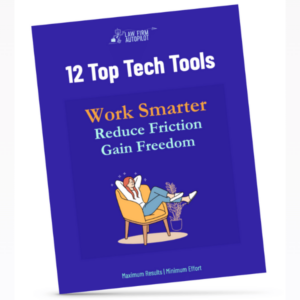Technology is complex, rapidly changing, and disruptive. So to get the most out of it, you need to reduce complexity and eliminate disruption.
That means using it strategically and selectively.
Focus on these 12 tech tools
These are the twelve tools you should spend more time on, above all others. These are ones that can massively transform your practice.
- Loom: for asynchronous video collaboration
- Calendly: effective scheduling of meetings & calls
- FancyHands: affordable outsourcing for common tasks
- 1Password: maximum cybersecurity protection for cloud data
- SweetProcess: effective process documentation (SOPs)
- Scribe: frictionless documentation of SOPs for rapid delegation
- TextExpander: a powerful text & document automation
- Sanebox: an AI-powered email filtering that lowers stress
- Otter.ai automated meeting transcripts and summaries
- Krisp.ai: AI-noise filtering & automated Zoom summaries
- ConvertKit: higher quality referrals using a powerful email tool
- ChatGPT/AI: all purpose AI that’s fast becoming indispensable
Understanding why you should use these tools and how to best leverage them requires an extensive explanation.
And that’s why I created this special guide. It’s for lawyers who value technology but struggle to fully harness it in their practices. If you’re interested, then…
- 👉 Click here to get instant access now
P.S. Get the Smart Lawyers Tech Guide.








